- Home
- Anne Stuart
Ritual Sins Page 2
Ritual Sins Read online
Page 2
“You were looking for me?” Luke Bardell said.
She would never forget nor forgive her initial moment of panic. She’d gone in search of him, to face the lion in his den. And instead he’d invaded hers.
He was as mesmerizing close up as he was from a distance. It wasn’t something as simple as physical beauty, though he had that in abundance. An elegant, narrow face, wide gray-blue eyes that looked at her with astonishing compassion, a nose and chin strong enough to give his angelic face masculine character, and a mouth that could seduce a saint.
He sat on her bed, ignoring the straight-backed chair, his long legs stretched out in front of him. He was wearing one of those baggy cotton outfits, though his was pure white instead of the pale colors the others wore. He had one of those tall, lean bodies that looked almost gaunt, and yet only a fool would underestimate the strength and power beneath the loose-fitting white tunic. His hair was very dark and very long, and it flowed down his back, and he watched her with his large, elegant hands folded quietly in his lap, watched her with faint curiosity and not the slightest hint of apprehension.
“How’d you get in here?” she demanded, not caring how hostile she sounded. “You scared the hell out of me.”
“We have no locks at Santa Dolores,” he said in a tranquil voice. “We don’t use harsh or profane language. It’s an infectious poison, just as surely as drugs and alcohol and animal flesh are.”
She resisted the impulse to tell him to fuck himself, she wasn’t sure why. “Sticks and stones may break my bones,” she murmured.
He raised his eyes to look at her, and she met his gaze with complete self-control. No wonder he was able to have otherwise intelligent adults eating out of his hand. Those eyes of his could make an iceberg melt.
But Rachel was frozen harder than an iceberg, and thoughtful looks and soulful eyes left her unmoved.
“You’re very angry with the Foundation of Being, aren’t you?” he said, not moving from her bed. “You think we took advantage of your mother.”
“No.” She began unfastening her silk jacket, determined not to be intimidated by him. “I think you took advantage of my mother. You seduced her, convinced her to leave her money away from her only child, and then you act as if you’re the misunderstood victim.”
His smile was slow and oddly unsettling. “I’m celibate.”
“So they told me. I don’t believe it.”
“You were asking, Rachel? Why did you want to know?”
The dark wouldn’t show the faint color that rose to her cheeks, she thought with sudden gratitude. “They volunteered the information.”
“How very odd,” Luke said, swinging his long legs around and rising from her bed. He was very close to her in the small room, and she realized he was quite a bit taller than she’d realized. She didn’t like tall men. But then, she didn’t like short men, or average men either, she reminded herself. There was nothing to be nervous about. “They must have divined somehow that you wanted to know. There are no coincidences in this life. No accidents.”
“Life is nothing but one long accident,” Rachel snapped, immediately regretting her impulsiveness. “If my mother hadn’t met you, she wouldn’t have fallen under your influence, and I wouldn’t be a pauper.”
“Yes,” Luke said gently, reaching up and touching a strand of her short-cropped hair. It was an oddly intimate gesture, one that left her frozen in place. “But you still wouldn’t have your mother, would you?”
She was still standing there, minutes after the door closed behind him.
2
They met in secret, the Grandfathers, with solemn faces and dignified demeanor. All of them, men and women alike, sat cross-legged on the rough floor, hands turned upward toward the sky as they waited for enlightenment. Even the outsider, the one who would never belong to their exalted group, sat in respectful silence.
They could be seen, perhaps, if someone tried hard to find them. But they couldn’t be heard. The Grandfathers met often, to discuss the financial well-being of the Foundation of Being, the uncertainty of the future, the wondrous change Luke Bardell had wrought in their lives.
As they did now. Alfred Waterston looked at the Grandfather next to him, his jowly face serene and determined. “How are we going to arrange Luke’s death?”
And the outsider carefully, politely, raised his hand.
So he’d won the first encounter, Rachel thought, staring at the rough wooden door. It made no difference. If she were a quitter she wouldn’t have come to Santa Dolores in the first place. There were things she couldn’t let rest in peace, and the occasional setback was nothing she didn’t expect. Besides, somewhere among these happy smiling people she had an ally.
He was right, of course, there were no locks on the doors. She wedged the straight-backed chair under the door handle, closed the shutters on her deep-set window, and began to strip off her clothes. If she viewed it objectively, it might not even be considered defeat. She hadn’t responded to the mesmerizing effect Luke Bardell was supposed to have on most people. She hadn’t even been tempted. She’d faced the enemy and survived. That in itself was a triumph.
The bathroom was small and utilitarian, a stall shower, toilet, and small sink, but the hot water was plentiful, and she stood beneath it for long, sybaritic minutes, letting it sluice over her, trying to soak away some of the edginess that threatened to consume her. She didn’t want to lose the tension and anger that fueled her, but she needed calm and control above all things. Luke Bardell and the Foundation of Being were formidable enemies. She needed every advantage she could muster.
The pastel cotton pajamas had disappeared during her foray, and she wondered who had taken them. The mint-green had never been her color in the first place, and she pulled on jeans and a T-shirt with a certain amount of defiance, finger-combing her short-cropped hair. The rooms at Santa Dolores didn’t come equipped with mirrors, probably to discourage vanity, but Rachel knew exactly what she looked like without having to check. Her clothes were deliberately shapeless on her too-thin body, her face pale and makeup-free, her eyes viewing the world with doubt and suspicion. There was nothing to inspire interest or desire in any but the most desperate, the most perverse.
She was out of place in this dream world. That in itself was nothing new. There was no longer any place on this earth that felt like home to her. From her earliest years she’d felt like a guest in her mother’s various apartments and townhouses, and the series of boarding schools she’d attended hadn’t been much better. She hadn’t the gift for making friends, unwilling to trust anyone enough to get close to them, so there’d be no other families to visit. From the time she’d left college she’d lived in a series of apartments, each one more spacious and anonymous than the previous one, ending up in a large, empty set of rooms in Manhattan’s East Seventies.
Less than a year ago it looked as if things might change. Her MBA from Harvard had stood her in good stead, providing her with a series of managerial jobs that she’d undertaken with cool efficiency. She’d just resigned her most recent one, emerging with a healthy savings account to augment the trust fund she’d grown up with, and she’d done one of the few capricious things she’d ever allowed herself. She’d packed a small bag with only the bare necessities and taken the next, shockingly overpriced flight to Spain.
It made no sense—Spain had never held any particular interest for her. But she’d arrived on a blisteringly hot, sunny day, rented a car, and driven until she was too tired to drive any longer, ending in a tiny village at the tip of a small peninsula. She’d found a house for rent, and there she’d stayed, hidden from the world and from her mother, for three long, glorious months, doing nothing but lying in the hot sun and eating fresh fruit and bread and cheese, letting the years of fear and anger bake out of her until she was dangerously close to being happy.
The house, belonging to an elderly grandmother in Andalusia, was for sale. And Rachel returned to New York full of an unlikely hope. She
would make peace with her critical mother. She would liquidate some of her stocks, buy the house in Spain, pack up her spartan belongings, and move back to the first home she’d known, with the first friends she’d ever had.
But her mother had already left New York for the cloistered solitude of Santa Dolores, refusing all communication with her only child. And for good reason. The trust fund, set up by Stella’s third husband, had already been stripped of everything Stella, as trustee, had access to. Stella’s Park Avenue condominium, with its fortune in artwork and antique furnishings, had been sold, and even the few good pieces she’d given Rachel over the years were missing from Rachel’s apartment.
Her healthy rage had carried her along for a number of months while she tried to recoup her shattered finances, searched for another high-paying, soulless job, and contemplated revenge on her uncaring mother.
The late night phone call from Santa Dolores had changed everything. The words, the voice, still echoed in Rachel’s head when she least wanted them to. “Your mother has taken her final journey,” the woman who’d introduced herself as Catherine had murmured over the phone. “Blessings, my child.”
Rachel had slammed down the phone, standing alone in her empty apartment, shivering slightly in the chill night air. “Blessings, my ass,” she said aloud. And then she began to cry.
As far as Rachel could remember, it was the last time she’d cried. She cried so seldom in this life that she could remember each and every rare, painful occasion. She had cried over her mother’s final, irrevocable loss. By the time she heard about the disposition of her mother’s substantial estate, including the pilfered trust fund, she’d gone far beyond tears to a blinding fury.
That fury still sustained her. But it required fuel, and she couldn’t remember when she last ate. It was close to six, the appointed hour when dinner would be served, and Rachel was feeling weak enough to eat anything, up to and including fried rats. Except that Luke Bardell’s little cult were vegetarians. In a few days fried rat might start to look tasty.
She wasn’t expecting the soft knock on the door. She moved the chair and opened it, half expecting her nemesis to make a reappearance, but the person standing there was a far cry from Luke Bardell’s unsettling, lethal presence.
She looked like the kind of mother Rachel had always secretly dreamed of. Plump and gray-haired, with kindly eyes and a sweet expression on her elderly face, the woman exuded warmth and concern. The kind of thing Rachel knew she should automatically distrust.
But anger seemed to be taking too much of her energy. She looked at the sweet old lady and felt a treacherous, sentimental longing.
“I’m Catherine Biddle,” the old woman said in a soft, gentle voice. “We spoke the night your mother died. My dear, I’m so very sorry I wasn’t able to give you more comfort at that sad time.”
Rachel tried to summon forth her caustic tongue, but her efforts were mild. “I wasn’t in the mood for comfort at that point,” she said.
“And you aren’t yet, are you?” Catherine said wisely. “Never mind, my dear. All things in their due course. I was hoping you might join me for dinner.”
“Here?” She knew she sounded doubtful.
“Where else would we go? All the answers we need are here with Luke’s People. We all share our meals—Santa Dolores is communal living at its purest. But if you care to join us at our table we would welcome you most happily.”
“Everyone eats together?” she asked warily. Despite the fact that her mysterious ally would be there, she wasn’t in the mood to confront all the happy campers of the Foundation of Being en masse. Particularly their leader.
“From the newest follower to Luke himself.”
“I’m not a follower,” she said sharply.
“Of course not, dear,” Catherine said comfortably. “I didn’t mean to imply that you were. But you’ve come to learn our ways, haven’t you? To see how your mother’s generous bequest is helping others less fortunate? You’ve come with an open mind and a willingness to partake of the peace and tranquility only Luke’s way can offer?”
The very thought filled her with horror. But Catherine Biddle looked so sweet and hopeful, so trusting, that something kept Rachel from being blisteringly frank.
“I’ve come to learn,” she said with complete honesty. And she would learn everything she could. Of course, she intended to use her newfound knowledge to strip the Foundation of her mother’s money as well as anything else she might manage to get away with. And to see Luke Bardell in hell if she could manage it.
“Of course you have,” Catherine said approvingly. “And learn you shall. And all the Grandfathers will be glad to help.”
“I don’t want to get anywhere near the Grandfathers,” Rachel said, following her into the hall. “I spend as little time as I can with old men in suits.”
“Grandfather isn’t a particularly descriptive term for our group of leaders. Most of them are old, but they’re not all men.” Catherine appeared faintly amused. “The Grandfathers dress as everyone else does here. You can tell what people do by the color of their clothing. Newcomers wear green. The Grandfathers wear gray.”
Catherine’s tunic and pants were a pale dove-gray. “Oh,” Rachel said.
“We’re nothing to be afraid of, Rachel,” Catherine continued in her soft, friendly voice. “The Grandfathers are like everyone else here, using their life knowledge for the good of humanity. We’d really like to show you some of our ways.”
For some reason the cynical response that rose to Rachel’s lips stayed there, unspoken. She may have been fiercely resistant to Luke Bardell’s mesmerizing tactics, but Catherine’s maternal warmth was a more potent threat.
She compromised. “I expect it will all be very interesting,” she said carefully.
Rachel hadn’t been paying attention to her sparse surroundings as they walked. Catherine had stopped by a pair of thick, plain doors, and she looked up at Rachel, her gray hair coming askew from its casual bun at the back of her head. “You don’t trust us,” she said in a cheerful voice. “I don’t blame you, my dear. At your age I was just as easily hurt, just as suspicious. But we’ll win you over. I know that we will.” She threaded her arm through Rachel’s, and she was surprisingly strong beneath the loose-fitting shirt. “Come and be welcome,” she said, and pushed open the door.
Catherine had been an inspired choice, Luke thought as he watched the two women. Everyone turned to Catherine for warmth and mothering, and a young woman who’d had very little mothering in the first place would be an easy mark. All the more so because Catherine’s motives were pure. Her maternal instincts, stunted for years, were entirely natural, and Rachel Connery’s cynical mouth was already softening.
Would he have as easy a time with her? He wondered if she would be likely to see him as a maternal figure. It was an entertaining notion. He usually managed to be all things to all the people in his flock—father, mother, child, and lover—all the while keeping his emotional distance. He might make a bet with Calvin, the one person here who really knew him, to see how long it would take him to subvert one angry young woman.
He’d taken her mother, and he’d taken her money, all with the angelic innocence of a saint. He’d take Rachel as well.
She hadn’t seen him yet, though he could tell she was trying to look. Catherine was taking her over to the Grandfathers’ table, and the others were eyeing her with distrust beneath their benevolent smiles. His followers were almost pathologically protective where he was concerned. They had no idea he had her well in hand.
He was sitting in the midst of the penitents tonight, their soft yellow clothing blending with his white tunic. He always sat with the flock, eating little, his presence a powerful stimulant. The penitents were almost trembling with excitement, unaware that all his attention was focused on the stubborn outsider.
“Will I ever find true understanding, Luke?” Melissa Underwood, a skinny blonde with a sexual addiction problem, edged closer. She h
ad spent the last year trying to turn her formidable sexual energy into some kind of search for peace, and he smiled at her benevolently. He wasn’t a man who wasted his energy on anything as capricious as a conscience, but if he ever had to face a judge again, in this world or the next, Melissa would be a point in his favor. Here she wasn’t courting death and disease, going through men and women at a voracious pace. At Santa Dolores she was living in quiet contemplation, paid for by her generous divorce settlement.
Bobby Ray Shatney was another one. He sat cross-legged at the end of the table, staring at his hands. Not many people knew that Bobby Ray, at the tender age of thirteen, had gone on a killing spree that had wiped out his entire family, three neighbors, a UPS man, and a cocker spaniel. He had the clear-eyed innocence of a child, his murderous rages washed clean from his body for as long as he was protected from the society that asked too much of him.
He looked up, catching Luke’s contemplative gaze, and smiled in drugged-out bliss. Besides, he was too tranked to hurt anyone, even if he was tempted.
Things would be different when Luke left. When this all came crashing down, and Luke had no choice but to decamp, he’d be leaving Bobby Ray and a few other lost souls like him to wreak havoc on the world and the other innocents who filled Santa Dolores. There would be no one to drug them into complacency. No one to control them with their childish belief in messiahs and salvation.
Luke Bardell knew what it was to kill. There wasn’t a day he spent on this earth when he didn’t remember the feel of the knife sliding past flesh and fat and muscle, sliding deep. The rich, black color of arterial blood, the rattle of death that came with shocking quickness. The smell of it.
They said it got easier. The more you killed, the more you wanted to repeat the act. Again and again. You could even grow to love it.

 Ice Blue
Ice Blue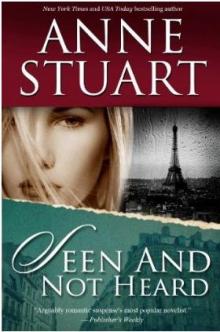 Seen and Not Heard
Seen and Not Heard Never Marry a Viscount
Never Marry a Viscount Heartless
Heartless The Devil's Waltz
The Devil's Waltz Hidden Honor
Hidden Honor Silver Falls
Silver Falls Fire and Ice
Fire and Ice Nightfall
Nightfall Never Trust a Pirate
Never Trust a Pirate The Soldier and the Baby
The Soldier and the Baby Still Lake
Still Lake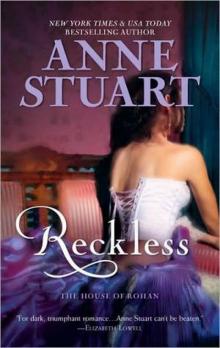 Reckless
Reckless The Spinster and the Rake
The Spinster and the Rake Winter's Edge
Winter's Edge At the Edge of the Sun
At the Edge of the Sun Into the Fire
Into the Fire Night of the Phantom
Night of the Phantom Ritual Sins
Ritual Sins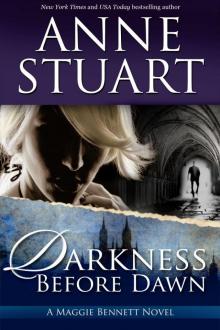 Darkness Before the Dawn
Darkness Before the Dawn Against the Wind
Against the Wind Ruthless
Ruthless The Catspaw Collection
The Catspaw Collection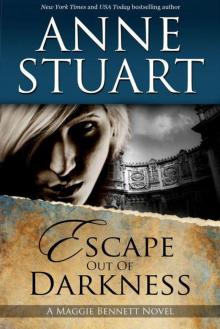 Escape Out of Darkness
Escape Out of Darkness The Widow
The Widow Shameless
Shameless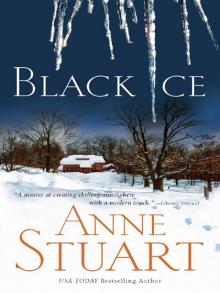 Black Ice
Black Ice Breathless
Breathless Shadows at Sunset
Shadows at Sunset Falling Angel
Falling Angel Housebound
Housebound Cold as Ice
Cold as Ice The Wicked House of Rohan
The Wicked House of Rohan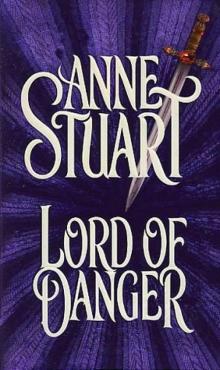 Lord of Danger
Lord of Danger The High Sheriff of Huntingdon
The High Sheriff of Huntingdon Wildfire
Wildfire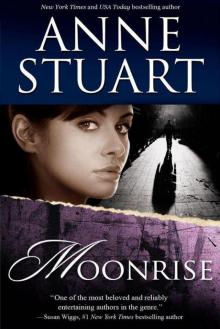 Moonrise
Moonrise The Demon Count's Daughter
The Demon Count's Daughter Date With a Devil
Date With a Devil To Love a Dark Lord
To Love a Dark Lord Driven by Fire
Driven by Fire Special Gifts
Special Gifts Ice Storm
Ice Storm Shadow Lover
Shadow Lover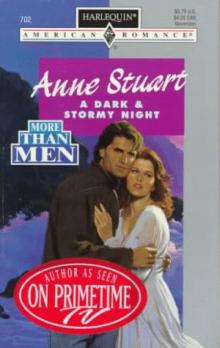 A Dark & Stormy Night
A Dark & Stormy Night Now You See Him...
Now You See Him...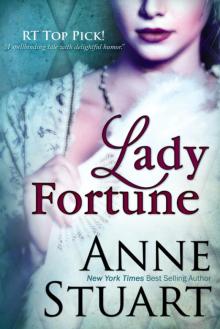 Lady Fortune
Lady Fortune Glass Houses
Glass Houses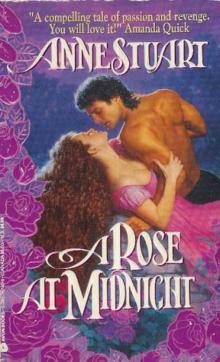 A Rose at Midnight
A Rose at Midnight Prince of Swords
Prince of Swords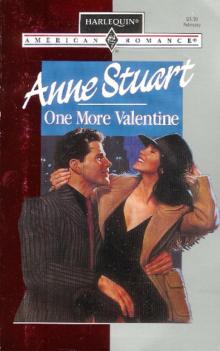 One More Valentine
One More Valentine Return to Christmas
Return to Christmas Tangled Lies
Tangled Lies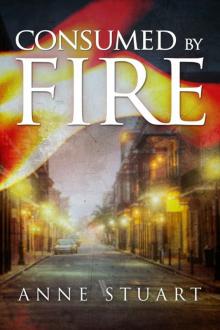 Consumed by Fire
Consumed by Fire The Fall of Maggie Brown
The Fall of Maggie Brown Wild Thing
Wild Thing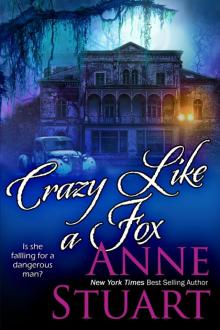 Crazy Like a Fox
Crazy Like a Fox The Demon Count
The Demon Count Prince of Magic
Prince of Magic Wildfire (The Fire Series Book 3)
Wildfire (The Fire Series Book 3)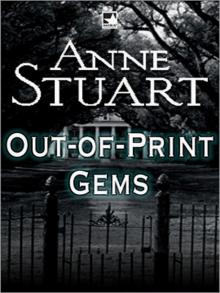 Anne Stuart's Out-of-Print Gems
Anne Stuart's Out-of-Print Gems Shadow Dance
Shadow Dance Under an Enchantment: A Novella
Under an Enchantment: A Novella Demonwood
Demonwood Blue Sage (Anne Stuart's Greatest Hits Book 3)
Blue Sage (Anne Stuart's Greatest Hits Book 3)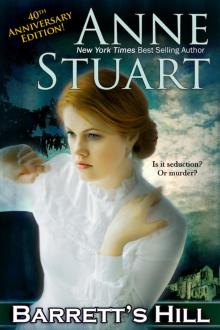 Barrett's Hill
Barrett's Hill Angel's Wings (Anne Stuart's Bad Boys Book 5)
Angel's Wings (Anne Stuart's Bad Boys Book 5)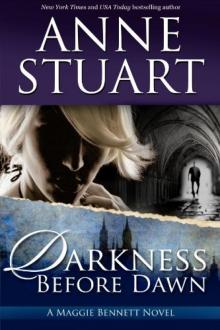 Darkness Before Dawn
Darkness Before Dawn The Right Man
The Right Man The Houseparty
The Houseparty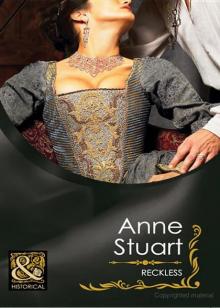 Reckless_Mills & Boon Historical
Reckless_Mills & Boon Historical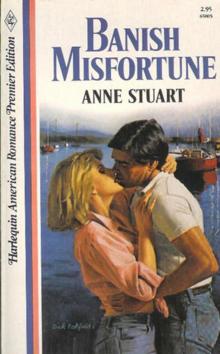 Banish Misfortune
Banish Misfortune Angel's Wings
Angel's Wings Chain of Love
Chain of Love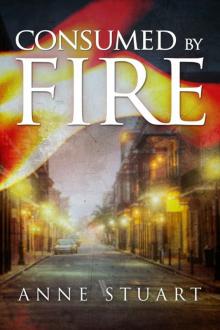 Consumed by Fire (The Fire Series)
Consumed by Fire (The Fire Series) Partners in Crime (Anne Stuart's Bad Boys Book 4)
Partners in Crime (Anne Stuart's Bad Boys Book 4) The Soldier, The Nun and The Baby (Anne Stuart's Greatest Hits Book 2)
The Soldier, The Nun and The Baby (Anne Stuart's Greatest Hits Book 2)